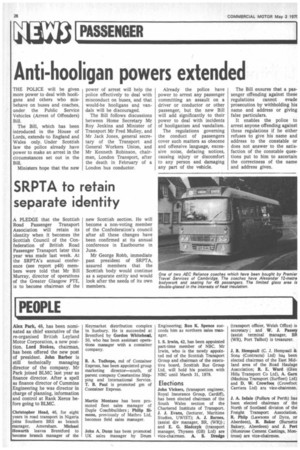Anti-hooligan powers extended
Page 28

If you've noticed an error in this article please click here to report it so we can fix it.
THE POLICE will be given more power to deal with hooligans and others who misbehave on buses and coaches, under the Public Service Vehicles (Arrest of Offenders) Bill.
The Bill, which has been introduced in the House of Lords, extends to England and Wales only. Under Scottish law the police already have power to make an arrest in the circumstances set out in the Bill.
Ministers hope that the new power of arrest will help the police effectively to deal with misconduct on buses, and that would-be hooligans and vandals will be discouraged.
The Bill follows discussions between Home Secretary Mr Roy Jenkins and Minister of Transport Mr Fred MuIley, and Mr Jack Jones, general secretary of the Transport and General Workers Union, and Mr Kenneth Robinson, chairman, London Transport, after the death in February of a London bus conductor. Already the police have power to arrest any passenger committing an assault on a driver or conductor or other passenger, but the new Bill will add significantly to their power to deal with incidents of hooliganism and vandalism.
The regulations governing the conduct of passengers cover such matters as obscene and offensive language, excessive noise, defacing notices, causing injury or discomfort to any person and damaging any part of the vehicle. The Bill ensures that a passenger offending against these regulations cannot evade prosecution by withholding his name and address or giving false particulars.
It enables the police to arrest anyone offending against these regulations if he either refuses to give his name and address to the constable or does not answer to the satisfaction of the constable questions put to him to ascertain the correctness of the name and address given.
























































































































